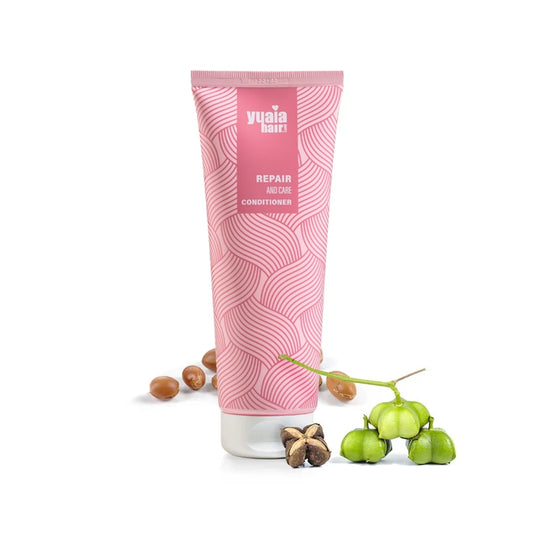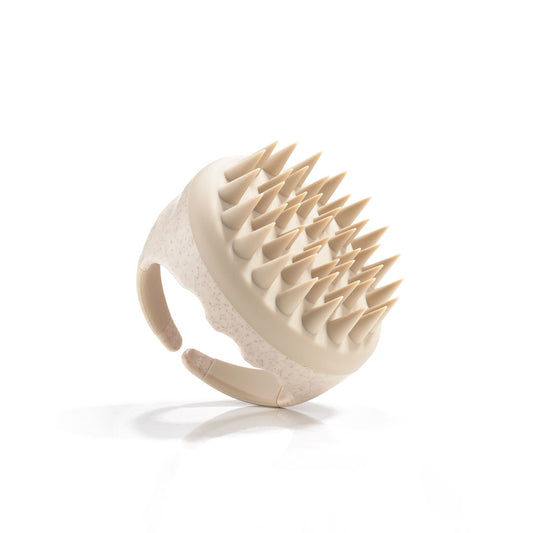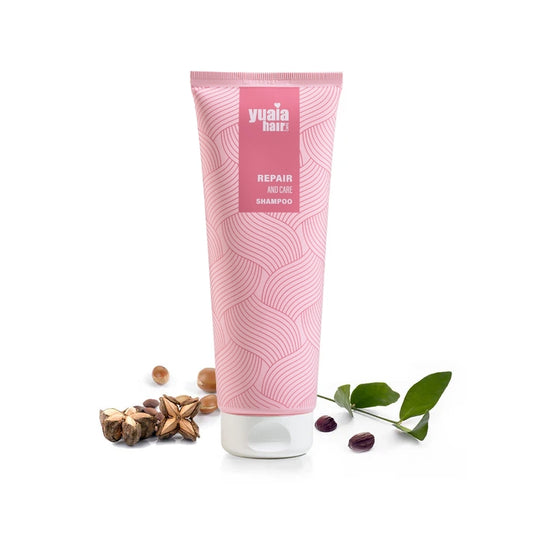
Dry scalp: The moisture deficiency
A dry scalp happens when the skin lacks moisture, often causing small, white flakes, tightness, and itchiness. It’s especially common in colder months when low humidity levels and indoor heating can dry out the skin. In addition, habits like over-washing or using harsh hair products with sulfates can worsen the issue and strip the scalp of its natural oils.
To manage a dry scalp effectively, it's helpful to choose moisturizing treatments such as hydrating masks or scalp oils that soothe and replenish the skin barrier. Reducing the frequency of washing, opting for lukewarm water instead of hot, and using gentle, hydrating shampoos all contribute to restoring moisture levels. With a consistent and nourishing routine, it's possible to relieve symptoms, reduce flaking, and support lasting scalp balance.
Psoriasis: An autoimmune concern
Scalp psoriasis is a chronic condition characterized by red patches covered with thick, silvery scales. Unlike dandruff, psoriasis is an autoimmune disorder that causes the body to speed up skin cell production, leading to the buildup of dead skin that forms noticeable plaques. These patches can be itchy, sore, and sometimes even crack or bleed, which significantly affects comfort and quality of life.
It can be persistent and may involve other parts of the body such as elbows, knees, or behind the ears. Scalp psoriasis may also lead to temporary hair loss due to frequent scratching or inflammation, though the hair typically grows back once the condition is controlled.
Dermatologists often recommend topical corticosteroids, vitamin D analogs, or light therapy to manage the condition. In more severe or resistant cases, systemic medications or biologics may be prescribed to help regulate the immune system and reduce flare-ups over time.
Seborrheic dermatitis: Beyond dandruff
While often associated with dandruff, seborrheic dermatitis can be more intense and persistent. It causes oily, yellowish flakes, redness, and itching. This condition stems from an overgrowth of yeast (Malassezia) on the skin and is often influenced by stress or hormonal changes.
Treatment typically includes antifungal shampoos with ingredients like ketoconazole or selenium sulfide. In more severe cases, dermatologists may suggest medicated creams to reduce inflammation. A steady scalp care routine is important to prevent future flare-ups.
Contact dermatitis: Allergic reactions on the scalp
Contact dermatitis on the scalp is typically triggered by an allergic reaction to ingredients found in hair products such as shampoos, conditioners, or styling sprays. This reaction can lead to symptoms like redness, intense itching, flaking, or even swelling, which may be mistaken for dandruff or dry scalp. The condition often appears shortly after introducing a new product into your hair care routine. It is important to stop using the suspected product immediately and consult a dermatologist if symptoms persist. Switching to fragrance-free or hypoallergenic hair care options can help soothe the scalp and prevent future allergic flare-ups.
Product buildup: The residue effect
Frequent use of styling products can cause residue to build up on the scalp, leading to irritation and flaking. This buildup is not caused by a skin condition, but rather by remnants of hair sprays, gels, oils, or dry shampoos that aren't fully removed during regular washing. Over time, these products mix with natural oils, sweat, and dead skin cells, forming a layer that clogs hair follicles and disrupts the scalp's balance.
To manage this, it's helpful to incorporate a clarifying shampoo into your routine every one to two weeks, depending on your product use. These shampoos are specially formulated to remove stubborn residues that ordinary shampoos may leave behind. In addition, gentle scalp exfoliation using either a scalp scrub or a silicone scalp brush can further help clear away buildup and support better circulation. By routinely detoxifying your scalp, you create a cleaner foundation for healthy hair growth and reduce the risk of flaking caused by congestion.
Fungal infections: The hidden culprit
Fungal infections like tinea capitis or scalp yeast infections can mimic dandruff but cause more irritation and sometimes hair loss. These require antifungal treatment—often medicated shampoos or prescriptions.
If symptoms don’t improve with regular products, see a healthcare professional for proper diagnosis and treatment.
How to treat a flaky scalp that isn’t dandruff
Treatment should reflect the actual cause, as using the wrong method can worsen symptoms. For dryness, rehydrate the scalp with gentle, moisturizing products and avoid harsh ingredients.
Autoimmune conditions like psoriasis may require prescription treatments and medical guidance, while fungal infections need antifungal shampoos or oral medications.
If symptoms don’t improve or worsen, consult a dermatologist to get an accurate diagnosis and appropriate treatment.
Preventative care and scalp maintenance
Maintaining scalp health requires a proactive and consistent approach. Use mild, pH-balanced shampoos that won’t disrupt the scalp’s natural barrier, and try to limit the use of heavy styling products that can weigh down the hair and contribute to buildup. Avoid over-washing, as this can strip the scalp of essential oils and lead to dryness and irritation.
Equally important is staying well-hydrated throughout the day to support skin function from the inside out. A diet rich in vitamins, minerals, and healthy fats—such as omega-3s, zinc, and vitamin E—can also play a role in supporting skin elasticity and reducing inflammation, both of which impact scalp health. In addition, managing stress levels, getting enough sleep, and protecting your scalp from excessive sun exposure are all helpful measures to promote long-term balance and comfort.
When flakes persist, seek clarity
A dry, flaky scalp can be caused by a range of issues beyond dandruff. Identifying the true source of the problem is crucial for effective treatment. If standard dandruff products aren’t working, don’t hesitate to dig deeper. Getting to the root cause may be the key to lasting relief and a healthier scalp.
Frequently Asked Questions
How can I tell if my flaky scalp is not dandruff?
If dandruff shampoos do not improve your symptoms, or if you notice additional signs like redness, thick patches, swelling, or hair loss, your flaky scalp may be caused by something other than dandruff. Conditions such as psoriasis, seborrheic dermatitis, contact dermatitis, product buildup, or fungal infections can mimic dandruff but require different treatments.
What are the most common causes of a flaky scalp besides dandruff?
Common causes include dry scalp, scalp psoriasis, seborrheic dermatitis, allergic reactions (contact dermatitis), product buildup, and fungal infections. Each has unique symptoms and may require specific treatments, so identifying the underlying cause is important for effective relief.
Can hair products cause a flaky scalp?
Yes, frequent use of styling products or shampoos with harsh ingredients can lead to product buildup or allergic reactions, both of which can cause flaking and irritation. Switching to gentle, fragrance-free, or hypoallergenic products and regularly clarifying your scalp can help prevent these issues.
When should I see a dermatologist for a flaky scalp?
If your symptoms persist despite over-the-counter treatments, worsen, or are accompanied by pain, swelling, or hair loss, it’s best to consult a dermatologist. They can provide an accurate diagnosis and recommend appropriate medical treatments for underlying conditions.
How can I prevent my scalp from becoming flaky in the future?
Maintain a gentle hair care routine with mild, pH-balanced shampoos, avoid over-washing, limit heavy styling products, and stay hydrated. Eating a balanced diet and managing stress can also support scalp health. Regularly clarifying your scalp and using moisturizing treatments can help prevent dryness and buildup.
 2-4 day UK delivery
2-4 day UK delivery
 25.000+ satisfied customers
25.000+ satisfied customers
 Satisfaction Guarantee
Satisfaction Guarantee





























